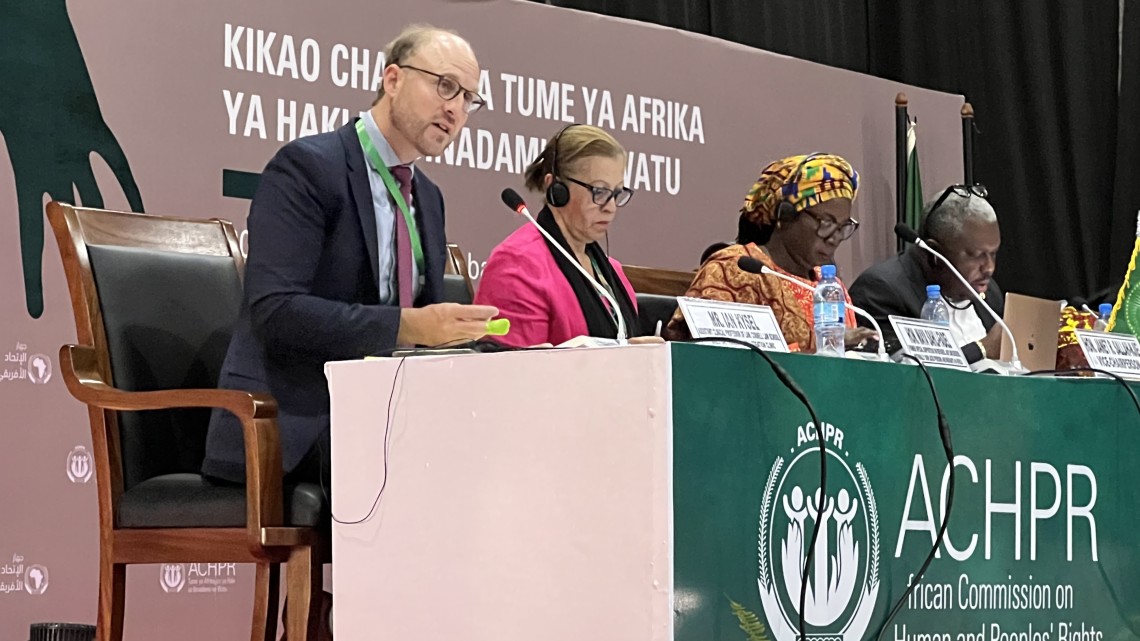
Assistant Clinical Professor of Law Ian Matthew Kysel (left) and Luwam Dirar LL.M. ’09 J.S.D. ’16 (right), an assistant professor at Western New England University School of Law.
News directly from Cornell's colleges and centers
Professors Ian Kysel and Luwam Dirar Lay Out Landmark African Migrant Rights Principles
For Cornell Law School Assistant Clinical Professor of Law Ian Matthew Kysel and Luwam Dirar LL.M. ’09 J.S.D. ’16, an assistant professor at Western New England University School of Law, a trip to Arusha, Tanzania, in October represented the culmination of three years of work promoting a progressive, rights-based framework for viewing migration across the continent of Africa.
Kysel and Dirar presented at the 77th Ordinary Session of the African Commission on Human and Peoples’ Rights, the rights body of the African Union (AU), as it formally launched the African Guiding Principles on the Human Rights of All Migrants, Refugees and Asylum Seekers (Guiding Principles) on October 21. The Guiding Principles draw on regional and international treaties signed by African nations to lay out the responsibilities those countries have to safeguard migrant rights and tap shared values to encourage African countries to cooperate and expand those rights.
“We want to give the commission, as well as states and civil society, a useful tool so that they have an easier time articulating—whether it’s in advocacy, lawmaking, or even litigation with governments—how states’ human rights obligations must apply in the context of migration,” said Kysel, an the founder and director of both the Migrant Rights Initiative and of the Transnational Disputes Clinic.
The Guiding Principles emerged from Kysel’s collaboration in 2020–21 with Maya Sahli-Fadel, then the commission’s Vice Chair and Special Rapporteur on Refugees, Asylum Seekers, Internally Displaced Persons, and Migrants in Africa, when Kysel and Sahli-Fadel were Global Public Voices fellows at Cornell’s Mario Einaudi Center for International Studies. Kysel had just finished work on a similar set of principles focused on migration in the Americas. In a series of discussions over the course of the year, the idea of producing a Guiding Principles document covering migrants in Africa was born.
Funding from the Robert Bosch Foundation allowed Kysel to hire Dirar and Fatma Raach, an assistant professor at Tunisia’s University of Jendouba, to work with him. The project also benefited from consultation with a range consortium of academic and civil society experts jointly convened with Sahli-Fadel, both virtually and in meetings at ACHPR headquarters in Banjul, The Gambia.
The Guiding Principles project has personal significance for Dirar, an asylee who was forcefully displaced from her country of origin of Eritrea, and who has family members that fled their home to locations elsewhere in Africa and beyond, as well as some still engaged in the process of migration. “I’ve heard stories of their experiences and how they don’t necessarily have rights like everyone does. Those rights kept on being eroded,” Dirar said. “I just felt like this is something I can contribute to, without imposing what I want, just trying to take what African states have on the ground now or in the past and trying to highlight values that advance the situation of migrants.”
Although the Guiding Principles are partially a plain restatement of established obligations, their authors also took the opportunity to push boundaries and expand the conversation. “We were excited to be able to collaborate with the commission and work with them to identify areas where they could not necessarily go further than the law allowed, but articulate a clear position where something wasn’t yet clear within the regional human rights law,” said Kysel.
For example, the authors developed the first definition of a climate migrant ever adopted by a governmental body and argued that, since climate change disturbs public order, climate migrants fleeing some climate change events should be considered climate refugees under the 1969 Organization of African Unity Refugee Convention. Also notable is the document’s encouragement of countries to protect the rights of diasporic communities, here conceived of expansively to include not only recent emigrants but all people of African descent.
As the AU pursues an “African passport” and works to remove restrictions on Africans’ ability to travel, work, and live within their own continent, the Guiding Principles can play a signal role in guiding states to apply existing human rights law obligations. Kysel has heard strong interest among colleagues at the AU and in wider African civil society in using the Guiding Principles to advance their legal advocacy and efforts to influence national immigration policy. And, he sees synergy with another of his projects: a Migrant Rights Database launched earlier this year, supported by Global Cornell’s Migrations initiative, that documents how effectively countries fulfill their responsibilities to safeguard those rights.
Media Contact
Get Cornell news delivered right to your inbox.
Subscribe